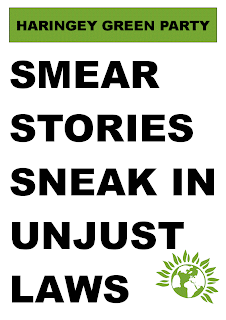As reported by the local newspaper the Ham and High almost two thirds (12 out of 21) of the Lib Dem councillors
on Haringey Council are stepping down at the London council elections in May.
The departing councillors rather skirt around the reasons
for taking this decision now, and the Lib Dem Group Leader cllr Richard Wilson even
suggests that this is all part of natural process. Come off it mate, I’ve never
known so many serving councillors quitting at the same time, and the reason is
plainly obvious.
The Lib Dems in Haringey and much of London
(and the north of England )
are a toxic brand. People in these areas voted Lib Dem because they were
unhappy with Labour in 2010, but are horrified by the subsequent ConDem
government’s attack on the welfare state. These councillors know full well that
they are highly unlikely to retain their seats and have no doubt been making
alternative plans for some time. Rats leaving a sinking ship, you might
reasonably conclude, rather than some natural turn over of personnel.
A brief look at the results of the GLA elections in 2012 paints the picture perfectly if you are in any
doubt about the Lib Dems prospects at this year’s local elections. Labour won
comfortably in every ward in Haringey, and in 18 of the 19 wards in the borough,
the Green party beat the Lib Dems. I said at the time, that the writing was on
the wall for Lib Dem councillors and sure enough they have just been marking
time for the last two years. Some of them have no doubt tried to do their best,
but such is the impossibility of providing good quality local public services,
whilst central government funding for local authorities is slashed, have
decided to jump rather than wait to be pushed.
But what of our MP and junior Coalition Government Minister,
Lynne Featherstone? Well she’s got another year to think about it, since she is not up for re election until 2015, but she is showing no sign of throwing
in the towel like fellow north London MP Lib Dem Sarah Teather (Brent central).
No, Featherstone seems to think she can win, because she is ‘personally
popular’ unlike her party.
There is a great myth spread around by Featherstone and her
supporters that she is a ‘good constituency MP’. We are bombarded in Hornsey
and Wood Green (Featherstone’s Parliamentary seat) with leaflets telling us
what a good constituency MP she is, a case of if you say something often enough,
people will eventually believe it.
Well, I’m not buying it. I admit she is very good at self
publicity, but that is all. She recently tried to take credit for the halting
of plans to build a huge waste plant at Pinkham Way , for instance, but this was
all the work of the residents in the Pinkham
Way Alliance
What’s more, she is an embarrassment in Parliament where she
is commonly referred to as ‘Featherhead’ by other MPs (including some in her
own party). But the main thing is, as the dozen departing Lib Dem councillors
realise, personal reputation, whether real or otherwise, is not enough to save
Lib Dem politicians. Featherstone will be unceremoniously booted out in 2015,
for the part her party has played in propping up this deeply unpopular Tory led
government.
Close the door on the way out please Lynne, but make sure it
doesn’t hit you in the face.














